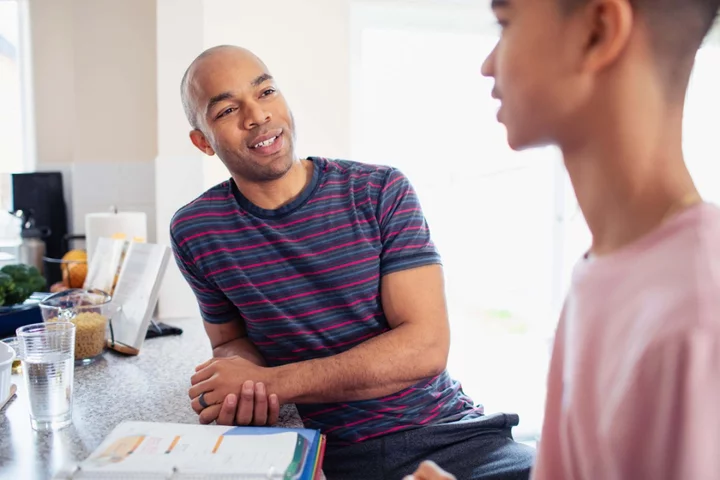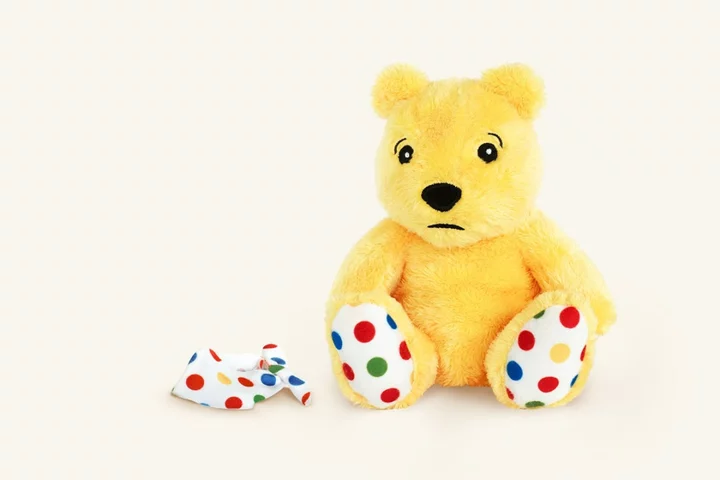
Reba McEntire joins 'The Voice' as a coach as Blake Shelton wraps up final season
As Blake Shelton's time on "The Voice" comes to an end, he'll be passing the torch to country music legend Reba McEntire.
2023-05-16 04:25

Drew Barrymore shares candid Mothers’ Day post about checking into rehab as a teen
Drew Barrymore has shared a “vulnerable” post about entering rehabilitation treatment at just 13 years old in honour of Mothers’ Day. On Saturday (May 13), the 48-year-old Hollywood star reflected on legally emancipating herself from her parents after a two-year stay at a drug rehabilitation center. In her blog post, the Drew Barrymore Show host also explained how growing up in the spotlight has influenced how she parents her own children. “When I got emancipated by the courts at 14 years old, the umbilical cord was severed, and I have not been the same since,” the Charlie’s Angels star wrote. “It was necessary for me to step away and start to become my own person. And at the age of 14, my own parent.” Barrymore shared that her mother – Jaid Barrymore – admitted her to a youth program for drug rehabilitation when she was 13 years old. The hospital, called Van Nuys Psychiatric, was located in Los Angeles, California. “Once the door shut behind me, my stay lasted almost two years,” she said. “I was in for the long haul. I bonded with a lot of the kids, because like me, they did not know where to put their anger and they did not know how to live life anymore without the need to get high or self-destruct in some form and fashion.” The Never Been Kissed star explained how the rehab center was a “revealing and healing” experience, from meeting with therapists to learning how to set boundaries. “Kids love feeling safe, and having boundaries is one of those crucial bumper rails,” she wrote. “I lived a boundaryless life and job. And this place, as hellacious as it was, it was exactly what I needed from the too much excess my life had become on the outside. “ Her two-year stint at the rehab center also taught Barrymore how to process her own emotions and understand the “foundations of telling your truth”. “Your feelings. Your faults. Your hopes and wishes. Your hurts. What and where you wanted to get to in life. And – very important – who was going to help you on your path and who would you have to let go,” she said. “For me, at the end and when I got out, it was my mother.” Despite winning emancipation from her parents at just 14 years old, Barrymore described how she “found family” in her friends and colleagues. Now, Barrymore has two daughters of her own – Olive, 10, and Frankie, nine – whom she shares with ex-husband Will Kopelman. Still, becoming a mother has brought up her own feelings about her rebellious childhood. “Being a mother constantly triggers everything from my own childhood now,” Barrymore wrote. “I live in an often-petrified state of thinking about my past and wanting to have things different for them. I want them protected. I want them to grow up slowly. I want family around and traditions and rules and boundaries.” While the 50 First Dates star went on to say that motherhood has been the “greatest thing I will ever do in my life without question,” she admitted that she still needs “to continue to figure things out” so that she can “disembark from my past and live in the present”. Barrymore concluded her candid blog post by describing a recent conversation she had with her own mother on Jaid’s birthday: “I texted her. It simply read ‘Happy birthday, Mom,’ and she wrote back, ‘Thank you so much! I’m incredibly proud of you and send you love.’” “It was the biggest gift I could have ever received. To know that she is proud of me,” the actor wrote, before adding a sweet message to her own daughters. “And to my girls… I just hope I can be someone who makes you feel safe. And that you can laugh with. And that you can tell me anything. I’m here for it. I’m in the circle with you… for life.” On Instagram, fans applauded Drew Barrymore for sharing the “open and raw” blog post. “Thank you for being vulnerable and sharing,” said one fan, while another wrote: “You are beyond inspiring.” Drew Barrymore has often spoken about her complicated childhood, ever since she rose to fame in Steven Spielberg’s ET the Extra-Terrestrial when she was seven years old. The child star, whose father John Drew Barrymore was also an actor, has since published multiple memoirs about her experiences with addiction as a teenager, including 1990’s Little Girl Lost and 2015’s Wildflower. In a 2015 interview with The Guardian, Barrymore referred to the youth treatment center at Van Nuys Psychiatric hospital as an “institution”, and revealed that it was the rehab center professionals who suggested she legally separate from her mother and be declared an adult at 14. “It was a very important thing to experience for me. It was very humbling, very quieting,” Barrymore recalled at the time. “Maybe it was necessary, because I came out of there a more respecting person. And my parents didn’t teach me that, and life wasn’t teaching me that. I came out in a very different way… but I still was me.” Most recently, Drew Barrymore shared in an essay last November that giving up alcohol has been “one of the most liberating things in [her] life”. The Ever After star, who previously revealed she hasn’t drunk alcohol in four years, reflected on how important it’s been for her to prioritise herself, even when it has felt “selfish” to do so. “Maybe our definition of love changes throughout our lives, but I truly believe so much love goes outward,” she wrote. “One of the bravest things you can do is slay those dragons and finally change an awful cycle in which you’ve found yourself stuck. For me, it was to stop drinking.” Read More Drew Barrymore mocks her viral dancing in the rain video in Wednesday-themed skit Drew Barrymore reveals she hasn’t been in a relationship since she stopped drinking alcohol Drew Barrymore admits to having a ‘boring’ sex life: ‘I’ve tried everything’
2023-05-16 02:51

Biden to Nominate Cancer Chief Monica Bertagnolli to Lead US NIH
President Joe Biden will nominate National Cancer Institute head Monica Bertagnolli to lead the full National Institutes of
2023-05-15 23:23

South Africa Beats Climate Goal as Blackouts Slash Emissions
South Africa is ahead of its target for cutting emissions of greenhouse gases. Output of the climate-warming gases
2023-05-15 22:54

9 actually useful things you can do to support teens this exam season
Exam season is underway, and many teenagers might be feeling overwhelmed about the important tests they’re facing over the next few months. “Sitting exams is often one of the most overwhelming and high pressure experiences teens face, and students often put immense pressure on themselves,” says Lara McIvor, a revision expert at Save My Exams. “For parents with children taking exams, it can be difficult to know how best to support their child without being too involved or under-supportive. “As parents and teachers, it should be our mission to ensure students have access to clear support systems, coping mechanisms and study techniques over these challenging few months, and we should all be better educated in the warning signs of stress in teens.” And Matt Buttery, CEO of the Triple P Positive Parenting Programme, adds: “This can be a stressful time, but the good news is that parents can support young people and help remove some of the pressure around exam season. By setting a positive example and encouraging them, you can help ensure they remain happy and healthy, as well as reach their full academic potential.” So what can parents and carers do to actually make the whole exam experience better for teens? 1. Encourage them to chat with you Encourage open communication, and if your teen seems stressed, ask if they’d like to talk through revision together, or more broadly discuss their concerns, suggests Buttery. “It’s important your child knows you’re there for them if they need you,” he stresses. 2. Set up a quiet study area Ensuring your child has an optimum place to study without distractions is vital to their success, McIvor says. “Often concentration can wane, so making sure there are limited external distractions – such as loud music or TV – will allow for the best results and prepare them for their silent exams,” she says. 3. Don’t just rush to make them feel better It’s vital to acknowledge what teenagers are feeling, rather than just trying to make it go away, stresses psychologist Dr Audrey Tang. “One of the most important things anyone can do is validate their right to feel as they do,” she explains. “We’re not very good at sitting with anxiety and often rush to try and make it go away or to feel better, and this can lead us to quick fixes which can include unhealthy behaviour choices such as not bothering to try, often led by unhealthy thoughts like ‘If I don’t try, I can’t fail’.” 4. Help teenagers unpack their feelings Encourage teens to analyse or unpack how they’re feeling about their exams and revision, advises Tang. “If we take a moment to respect our feelings, and try to unpack exactly what we’re worrying about, we may be able to work out what we need to do next,” she explains. For example, is your teen’s anxiety caused by them not understanding some things, and if it is, which specific bits are causing the problem? Or is it linked to knowing their parents are stressed and not wanting to add to it, and if that’s the case, are other services available? “When we begin to unpack our feelings, rather than suppress or deny them, we have a better idea of what action is going to help us the most,” Tang explains. 5. Help with visual prompts Creating an ongoing learning environment throughout the exam period is key, says McIvor. She suggests sticking notes with key quotes, equations, etc on them around the house in places where your child can always see them. “This can be really useful for some students as it allows for constant exposure to materials,” she explains. 6. Avoid ‘toxic positivity’ If a teenager says things like, ‘I’m so stupid’, or ‘I’m rubbish at everything’, it’s natural for parents to tell them they’re brilliant, observes Tang. “Unfortunately, this has the effect of not validating those emotions, and the opportunity to understand what they’re trying to say is lost,” she explains. “A better way to navigate that discussion would be to acknowledge the feeling with something like ‘I’m really sorry you’re feeling that way’, and asking for more information.” 7. Be a good role model Role modelling healthy ways to manage your own anxiety is hugely important, stresses Tang. “Why would you expect a young adult to listen to you if you aren’t showing in your own practice that what you’re suggesting works?” she asks. And Buttery advises parents to lead by example by staying positive and calm when talking about exams. “Avoid using phrases such as, ‘You must be nervous’,” he says, “As you may risk accidentally making an otherwise calm child more stressed. Children learn a great deal about how to manage their behaviour and deal with difficult situations from their parents. By demonstrating calm and resilient behaviour, parents can have a positive influence on their children’s ability to cope with adversity.” 8. Try stressbusting techniques together Tang suggests practising self-care or stressbusting techniques together, such as affirmations with deep breathing. One technique, she says, is to get your child to note down everything they need to do and its relative importance on a pie chart, where the size of the slice shows the importance of the activity. Then ask them to draw on a scale of zero in the centre, to 10 on the outside, where they are in each segment. “This gives them a visual representation of what they need to do, and where they are, as well as an indication of the areas they’re neglecting, and how important those areas are,” she says. “By having everything on one pie chart, it might feel a lot more manageable.” 9. Maintain the family routine Ensuring family dinners and other rituals remain part of daily life can help teenagers cope with exam stress, as routine is predictable and reassuring at a time of pressure and uncertainty. Maintaining structure can also help your child plan their downtime, stresses Buttery, who adds: “It’s important to ensure they’re taking time to relax and unwind, whether by watching their favourite TV show, playing a game, or hanging out with friends.” Read More Charity boss speaks out over ‘traumatic’ encounter with royal aide Ukraine war’s heaviest fight rages in east - follow live Children In Need removes Pudsey’s bandana to show not all challenges are visible Is your child too anxious to go to school? What’s the link between the menopause and anxiety?
2023-05-15 22:15

Alice Braga is eager to star in I Am Legend sequel
Alice Braga would not hesitate to join the cast of the sequel to 'I Am Legend'.
2023-05-15 19:55

Lewis Capaldi offers more than 900 free tickets to intimate Glasgow gig
Lewis Capaldi is performing an intimate gig at the 2,500-capacity O2 Academy Glasgow next month.
2023-05-15 19:27

How to check if you have skin cancer: Symptoms and signs to look out for
It is the most common form of cancer in Britain and kills around 2,100 people in the UK each year, but still a “shocking” number of people remain unaware of the dangers of skin cancer, its links to sunburn, and how to spot the signs of this deadly disease. An overwhelming 77 per cent of people would not recognise signs of a melanoma – a malignant skin cancer tumour – despite the majority of Britons worrying about skin cancer, a new study by the British Association of Dermatologists (BAD) has found. There are two types of skin cancer; melanoma, the deadliest form of which around 13,000 new cases are diagnosed each year in the UK, and non-melanoma, of which there are more than 100,000 new cases diagnosed every year. The risk of melanoma is doubled if a person has had five or more sunburns at any age, the Skin Care Foundation states, but adds that experiencing just one blistering sunburn in childhood or adolescence more than doubles a person’s chances of developing a melanoma later in life. Non-melanoma comes in two most common forms: basal cell carcinoma, which accounts for about 75 per cent of skin cancers, and squamous cell carcinoma, which accounts for about 20 per cent. It is mainly caused by overexposure to UV light. But despite the serious risks of cancer posed from sunburn, nearly three quarters of people surveyed by BAD admitted to having been burned in the past year alone, while 40 per cent of people were found to never check themselves for signs of cancer. Here is how to check for possible signs of melanoma and non-melanoma skin cancer: Melanoma: The NHS states the first signs of a melanoma is often a new mole, or the change in appearance of an existing mole. Moles are usually round or oval, with a smooth edge, which is not bigger than 6mm in diameter. Any change in size, shape, or colour, any bleeding, crustiness or itchiness, or how painful a mole is should be shown to a doctor. The NHS has an ABCDE checklist to help people tell the difference between a normal mole and a melanoma: Asymmetrical – melanomas have two very different halves and are an irregular shape. Border – melanomas have a notched or ragged border. Colours – melanomas will be a mix of two or more colours. Diameter – melanomas are larger than 6mm (1/4 inch) in diameter. Enlargement or elevation – a mole that changes size over time is more likely to be a melanoma. Non-melanoma: Non-melanoma usually appears as a lump or discoloured patch of skin that does not heal. If a person experiences on of these patches that do not heal after four weeks, they should see their GP. Signs of Basal cell carcinoma can look like a small red or pink lump, though it can also appear as a pearly-white or waxy-looking lump, or it can also appear as a red or scaly patch of skin. The lump, whether pink or white, will grow slowly and can become crusty or bleed, or become a painless ulcer. Signs of Squamous cell carcinoma are the appearance of a firm pink lump. This lump could have a flat, scaly or crusted surface, often bleeds easily and feels tender to touch and can also become a painless ulcer. Read More UK skin cancer statistics 'shocking' Skin cancer referrals up 41 per cent in 5 years Wolverine star Hugh Jackman treated for skin cancer Cheap holidays blamed for huge rise in skin cancers
2023-05-15 19:16

Dua Lipa and Little Mix songwriter Kamille teams up with Nile Rodgers on new song
Kamille admitted it's "such an honour" to have the Chic legend featured on her original song.
2023-05-15 19:15

The Weeknd is no more. The Canadian singer has reverted to his birth name on social media
The Weeknd is now officially known online by his real name -- Abel Makkonen Tesfaye -- after following through on plans to update his social media accounts.
2023-05-15 18:17

Funds Sold as ‘Sustainable’ Hit by Crossborder Reality Check
Hardly any sustainable funds would consistently be able to market themselves as such in the UK, the US
2023-05-15 17:52

Children In Need removes Pudsey’s bandana to show not all challenges are visible
BBC Children In Need has launched a new Behind The Bandana campaign to mark Mental Health Awareness Week. The charity has temporarily removed mascot Pudsey’s eye covering to show “not all of the challenges that children and young people may be facing are visible”, the broadcaster said. The campaign encourages conversations between children and parents, carers and other trusted adults “to ensure no child faces their emotional and mental health challenges alone”. Former Love Island contestant Dr Alex George, who has campaigned for better mental health after the death of his 19-year-old brother Llyr by suicide in 2020, has been named Behind The Bandana ambassador. He said: “I know how important early intervention is in helping make a difference to the emotional wellbeing of children and young people and so I am very proud to be the ambassador of such a powerful campaign that really shines a light on the mental health crisis we are facing. “As highlighted by Pudsey bear himself, mental health issues can be less visible on the outside, but conversations and positive relationships really can help.” What’s also clear is that we can all play a role in addressing early signs of worry and anxiety by showing children and young people that we’re here to listen and to support them Simon Antrobus, Children In Need As part of the campaign, Children In Need has released the findings of a new Censuswide survey shedding light on how comfortable children feel when asking for help with their feelings and how often they feel the need to put on their “metaphorical bandana” and hide their emotions. While nine in 10 parents surveyed said they talk to their child about their mental health at least once a month, more than a quarter of young people surveyed said they had not talked to someone they trust about their mental health in the last six months. Children In Need’s boss Simon Antrobus said: “This research is a clear indication that our Behind The Bandana campaign is urgently needed. “What’s also clear is that we can all play a role in addressing early signs of worry and anxiety by showing children and young people that we’re here to listen and to support them. “By recognising and acknowledging that some feelings of worry and anxiety can be hidden means early conversations, sensitively delivered with kindness and empathy, can make a real difference to a child’s wellbeing and can help prevent mental health problems from becoming embedded.” Read More Charity boss speaks out over ‘traumatic’ encounter with royal aide Ukraine war’s heaviest fight rages in east - follow live
2023-05-15 17:21
